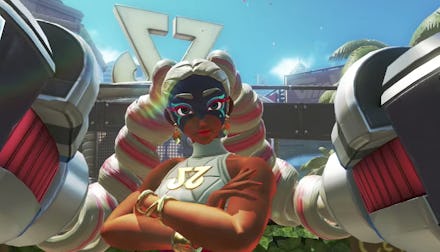What Nintendo gets wrong with Twintelle, the new WOC fighter from 'Arms'

Twintelle, a newly announced character in Nintendo's boxing title Arms, may be the latest video game "It girl." But there's always someone who isn't feeling the latest thing causing a stir on the internet — and sometimes that's me.
When I first saw Twintelle, I couldn't get excited like everyone else. All I could think about was her hair. Specifically, the fact she's a brown, female character with weaponized hair.
The thing is, hair like mine is often weaponized in real life, too. It's been made illegal to wear as it grows, been feared and politicized to the point of having job offers rescinded because the wearer has locs instead of chemically straightened hair, or been checked while going through airport security without a legitimate reason. Games and media seeing my hair differently as a person of color is nothing new.
What's particularly strange here is how this specific fighting method is limited to the only brown character in the game. All the other fighters in Arms have spring-loaded arms for weapons, including the other female fighters we've seen so far. So why does the brown girl have to use her hair as a weapon? Why can't our hair be depicted accurately in video games or included in character customization options? Why do we get so few choices when it comes to being brown in games? And who at Nintendo thought this was actually OK?
This isn't first time I've had to consider the issue of hair and POC characters in games — either because of limited choices for natural hair or a lack of options altogether. But with Twintelle, Nintendo gaming demonstrated that the industry still doesn't get it, forcing me to confront this problem yet again.
A new spin on an old problem
Sadly, this conversation is nothing new. A great essay I always point back to is Evan Narcisse's "The Natural: The Trouble Portraying Blackness in Video Games," a personal piece on how Narcisse loves being black but how games don't love him being black and rarely offer his haircut in character customization menus. Whether taking place in the future, in the past or in a totally new place and time, the games just don't offer a simple fade to help Narcisse make a digital avatar of himself.
As Xavier Harding wrote for Mic, there are still too few games where a character has natural hair options that don't look terrible. More often than not, we're stuck with the same low-cut fade or braids that aren't really feasible as a day-to-day hairstyle.
Consider most games where you can customize your character. Rarely do you see decent black hair options. Natural hair is an afterthought if it exists at all. Worse is when it's given as an option to everyone but POC characters in games. You can see this in recent games like Dragon Age: Inquisition, one of the non-playable characters Aloy works with in Horizon Zero Dawn, and Mass Effect: Andromeda, which provides just three natural-hair options total: one braided option for your female-presenting Ryder and two for your male-presenting Ryder.
Games aren't the only form of media to treat hair as a way to other a nonwhite character, but they are certainly one of the most visible examples due to a lack of diversity in the industry. Roughy 76% of gaming industry employees are white males, according to a 2016 report from the International Game Developers Association. So it's likely that very few Nintendo employees even considered how Twintelle's hair might be perceived.
It's not just an issue in video games
Twintelle's hair may seem trivial to folks who don't have to deal with films, TV shows and ads where people who look like them aren't depicted. To them, it might even seem like I'm reaching for something to complain about. But that's a side effect of not seeing yourself represented often or well in something you love.
Every time we see a brown character, we see what's there and what's missing. We all see the media we consume like it's a mirror, but when there's very little out there that actually represents us, we have to check that reflection with a sharper eye. So when we're finally present in a major game release, we notice all the imperfections, lines and blemishes.
A blunder like Twintelle's hair doesn't mean companies should stop making diverse characters. It's an urgent reminder why better hair options matter, why fans should be critical of the media they consume and why companies should be mindful of who picks up their next title and how they might feel as a gamer whose background isn't European.
What Twintelle signifies — at least for me and maybe others — is that our hobby and our love of this art form would mean a lot more if it recognized us and loved us back.